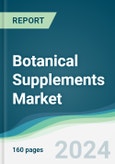Botanical Supplements are products derived from plants, parts of plants, or plant extracts that are used in supplement diets and enhance health. They are used in both traditional and alternative medicine and are delivered in forms such as tablets, capsules, soft gels, gel caps, liquids, and powders. They can include products such as echinacea, green tea extract, garlic, and even the evening primrose oil for health purposes. They also feature in herbal or herbal dietary supplements.
It is expected that the market for botanical supplements will grow at a considerable pace because of the increasing awareness among consumers about health and wellness, and increasing preference for natural products. These characterized the popularity of botanical supplements like Ashwagandha and Valerian root that target mental functionality for reduced stress and enhanced moods. There will be a rise in this trend, as consumers have shown little faith in synthetic drugs due to side effects and risks related to them.
Botanical supplements market drivers:
Increasing demand for natural products
The development of the botanical supplements market is anticipated to witness a continuous rise as consumers are inclined more toward the natural products market because they want holistic health solutions. This trend is fueled by the growth in distrust of synthetic drugs considered by many as less safe and attributed to potential side effects and long-term risks.Thus, consumers have increasingly turned to natural products to prevent chronic diseases and overall health by consuming botanical supplements that usually comprise a single plant or a mixture of a few plants because they are perceived as simple and recognizable ingredients. A report published by the American College of Cardiology Foundation on December 2023, showed that the global death rate due to Cardiovascular diseases (CVDs) increased sharply as seen from 12.4 million in 1,990 to 19.8 million in 2022, mainly as a result of an increase in population and age effects, which is expected to fuel the botanical supplement demand in the coming years.
The Botanical supplements market is segmented into five regions worldwide:
High obesity rates and lifestyle-related diseases among the large population in North America are primarily caused by dietary habits, high disposable incomes, and the availability of numerous processed and ready-to-eat foods that may not be health-friendly for consumers. The United States botanical supplements market is experiencing significant growth primarily driven by increasing consumer awareness of health and wellness, a shift towards natural and organic products, and a rising demand for preventive healthcare solutions.One of the key drivers of this market expansion is the growing acceptance of botanical supplements among diverse demographic groups. Consumers increasingly turn to these products for their perceived health benefits, including immune support, cognitive enhancement, and overall well-being. This trend is particularly pronounced among health-conscious individuals who prefer natural alternatives to synthetic supplements. Furthermore, the popularity of traditional herbal remedies from various cultures has contributed to the demand for specific botanicals like turmeric, ginger, and ashwagandha, which are recognized for their therapeutic properties.
Furthermore, the rising prevalence of obesity in the United States is significantly driving the growth of the botanical supplements market. As obesity rates continue to climb, with the percentage rate reaching 9.4% from August 2021 to August 2023, there is an increasing consumer focus on weight management solutions. This public health crisis has heightened awareness around the importance of maintaining a healthy weight, leading many individuals to seek dietary supplements that can aid in weight loss and overall wellness.
Reasons for buying this report:
- Insightful Analysis: Gain detailed market insights covering major as well as emerging geographical regions, focusing on customer segments, government policies and socio-economic factors, consumer preferences, industry verticals, other sub-segments.
- Competitive Landscape: Understand the strategic maneuvers employed by key players globally to understand possible market penetration with the correct strategy.
- Market Drivers & Future Trends: Explore the dynamic factors and pivotal market trends and how they will shape up future market developments.
- Actionable Recommendations: Utilize the insights to exercise strategic decision to uncover new business streams and revenues in a dynamic environment.
- Caters to a Wide Audience: Beneficial and cost-effective for startups, research institutions, consultants, SMEs, and large enterprises.
What do businesses use our reports for?
Industry and Market Insights, Opportunity Assessment, Product Demand Forecasting, Market Entry Strategy, Geographical Expansion, Capital Investment Decisions, Regulatory Framework & Implications, New Product Development, Competitive IntelligenceReport Coverage:
- Historical data & forecasts from 2022 to 2030
- Growth Opportunities, Challenges, Supply Chain Outlook, Regulatory Framework, Customer Behaviour, and Trend Analysis
- Competitive Positioning, Strategies, and Market Share Analysis
- Revenue Growth and Forecast Assessment of segments and regions including countries
- Company Profiling (Strategies, Products, Financial Information, and Key Developments among others)
The Botanical supplements market is segmented and analyzed as follows:
By Source
- Leaves
- Herbs
- Flowers
- Roots
- Others
By Product Form
- Powder
- Liquid
- Tablets
- Others
By Distribution Channel
- Online
- Offline
- Supermarket/Hypermarket
- Pharmacies/ Drug Stores
By Application
- Pharmaceuticals
- Food and Beverages
- Personal Care
- Others
By Geography
- North America
- South America
- Europe
- Middle East and Africa
- Asia-Pacific
Table of Contents
Companies Mentioned
- Gaia Herbs
- Bio-Botanica Inc.
- Nature's Bounty Co.
- Dabur
- Blue Sky Botanics
- Ransom Naturals Ltd
- Prinova Group
- NOW Food
- Amway Corporation
- Ricola AG
- Herbalife








